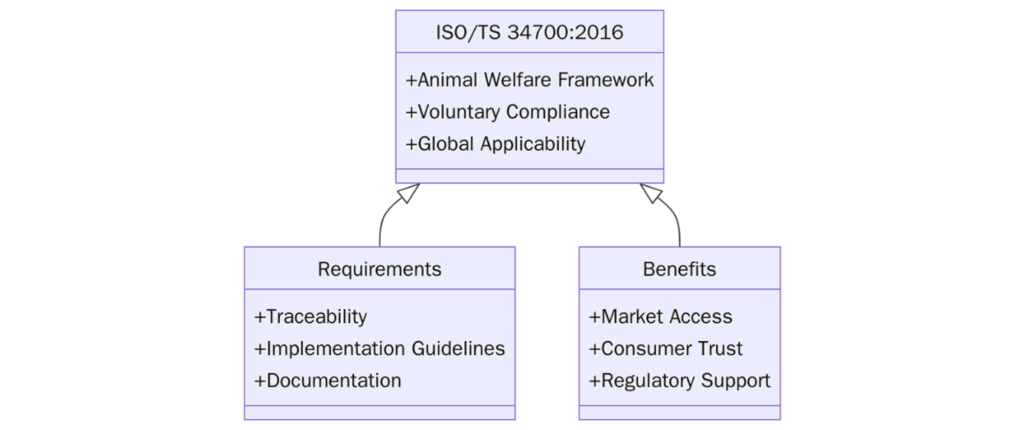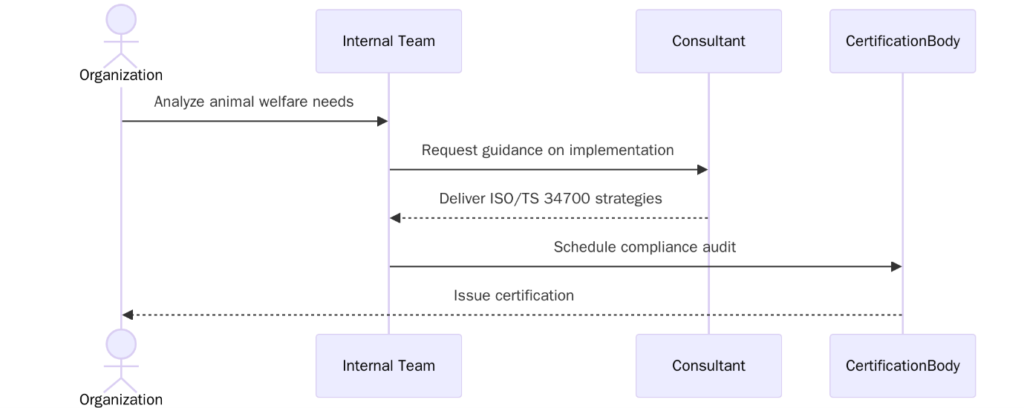What is ISO 34700?
ISO/TS 34700:2016 provides a set of technical specifications that outline the general requirements for implementing animal welfare management systems in organizations involved in the food supply chain. Based on the principles and recommendations of the World Organisation for Animal Health (WOAH, formerly OIE), this standard supports companies in demonstrating compliance with international animal welfare practices across the supply chain, from farm to slaughter.

ISO/TS 34700 establishes a process-based management system, meaning it focuses on systematically managing animal welfare outcomes rather than prescribing specific techniques.
If you are looking for compliance support aligned with ISO/TS 34700, contact us at support@pacificcert.com
Purpose
The purpose of ISO/TS 34700:2016 is to:
- Provide a framework for organizations to demonstrate that they meet animal welfare responsibilities in a consistent and transparent manner
- Align animal welfare practices with internationally recognized principles and guidelines, particularly those of the OIE
- Encourage the humane treatment of animals throughout the supply chain, including during production, transport, and slaughter
- Support organizations in building consumer confidence, improving supply chain transparency, and mitigating reputational and operational risks
- Facilitate harmonization of animal welfare requirements across countries and industry sectors
Scope and Applicability
ISO/TS 34700 applies to all organizations within the food supply chain that handle animals bred or kept for food production. This includes primary producers, transporters, processors, traders, and retailers. The standard is applicable across different animal species and production systems, provided they are part of a supply chain intended for human consumption.
Applicability:
- Livestock farms (poultry, cattle, pigs, sheep etc)
- Animal transport and logistics companies
- Slaughterhouses and meat processing facilities
- Food manufacturers and brands sourcing animal-based ingredients
- Supermarkets, retailers, and foodservice providers
- Animal welfare certification programs and verification bodies
If your operations involve animals in the food supply chain, ISO/TS 34700 provides an internationally aligned animal welfare management framework.
Key Principles Based on OIE Guidelines
ISO 34700 is rooted in the following five animal welfare freedoms, as originally defined by the OIE:
- Freedom from hunger, malnutrition, and thirst
- Freedom from fear and distress
- Freedom from physical and thermal discomfort
- Freedom from pain, injury, and disease
- Freedom to express normal patterns of behavior
These principles guide the development of internal policies, performance criteria, and controls related to animal welfare across the supply chain.
Clause-wise Structure of ISO 34700
Clause | Title | Overview |
1 | Scope | Defines the applicability of the technical specification to organizations involved in food animal handling. |
2 | Normative References | Lists other relevant standards (ISO 22000, OIE Codes). |
3 | Terms and Definitions | Clarifies technical terms such as “animal welfare,” “stakeholder,” “control point,” etc. |
4 | Context of the Organization | Requires identification of internal and external factors affecting animal welfare performance. |
5 | Leadership | Addresses the role of senior management in setting an animal welfare policy and ensuring accountability. |
6 | Planning | Involves setting animal welfare objectives, identifying risks and opportunities, and defining performance indicators. |
7 | Support | Covers resource provision, staff competence, awareness, and documentation. |
8 | Operational Planning and Control | Details the procedures for managing animal handling, care, transport, housing, and slaughter. |
9 | Performance Evaluation | Requires monitoring, measurement, analysis, and internal audits of animal welfare performance. |
10 | Improvement | Covers corrective actions, nonconformity handling, and continual improvement. |
Implementation Requirements of ISO 34700
To implement ISO 34700, organizations should:

- Define and document an animal welfare policy aligned with international standards and company values
- Conduct animal welfare risk assessments at each supply chain stage
- Establish clear objectives and metrics (e.g., mortality rates, injury incidents, handling times)
- Train personnel in animal behavior, handling techniques, and humane transport or slaughter procedures
- Create systems for recordkeeping, audits, and reporting of animal welfare data
- Ensure emergency preparedness in case of animal health or transportation incidents
- Implement procedures for handling nonconformities, including corrective and preventive actions
For organizations looking to establish a robust animal welfare management system, ISO/TS 34700 provides a practical, globally relevant approach, contact us at support@pacificcert.com to know more!
Documentation Required of ISO 34700
Animal welfare policy and scope statement
- Organizational roles and responsibilities for animal care
- Training records for staff involved in animal handling
- Risk assessments and mitigation plans for transport, housing, and slaughter
- Records of animal health, stress levels, and welfare performance indicators
- Nonconformity reports and corrective actions
- Internal audit plans and review reports
- Stakeholder communication procedures (e.g., suppliers, regulators, consumers)
Benefits of ISO 34700 Implementation
- Ensures that practices are internationally recognized and respected
- Builds consumer confidence in animal-derived food products
- Supports adherence to national and international animal welfare laws
- Facilitates entry into markets where animal welfare compliance is a prerequisite
- Minimizes reputational and operational risks related to poor animal handling or ethical concerns
- Improves traceability and transparency in how animals are treated
- Trains staff in ethical and effective animal handling
- Encourages responsible sourcing and humane practices

If you aim to demonstrate animal welfare compliance through a credible management system, ISO 34700 can provide the framework. Contact us at support@pacificcert.com for support!
Certification Timeline
Many organizations seek conformance assessments or integrate it with certifiable standards such as ISO 22000 (food safety) or ISO 14001 (environmental management).
A conformance assessment timeline is approximately 6 to 8 weeks, depending on the complexity of the supply chain and documentation readiness.
Week | Activity | Details |
Week 1 | Scope definition and gap analysis | Identify animal welfare risks and compliance gaps |
Week 2–3 | Documentation review | Examine welfare policies, procedures, and training systems |
Week 4 | Site audit planning | Prepare for onsite assessments or interviews |
Week 5–6 | Onsite assessment (farms, transport, slaughter) | Verify handling practices, facilities, and welfare controls |
Week 7–8 | Report submission and follow-up actions | Address findings and prepare conformance report or certificate of alignment |
For a customized certification timeline or compliance evaluation, contact us at support@pacificcert.com.
Certification Cost
The cost for ISO 34700 conformance assessment or integration into other ISO systems depends on:
- Size and complexity of the supply chain
- Number of farms, transporters, or processing sites involved
- Readiness of documentation and internal controls
- Scope of assessment (species, production systems)
- Whether certification is integrated with ISO 22000, ISO 14001, or others
To request a cost estimate for ISO/TS 34700 conformance or integrated certification, contact us at support@pacificcert.com
How Pacific Certifications Can Help?
Pacific Certifications, accredited by ABIS, offers independent conformance assessments and audit services for ISO 34700 and related food chain standards.
We provide:
- Independent audit of animal welfare management systems
- Evaluation of conformity with ISO 34700 and OIE principles
- Documentation and process review across the food supply chain
- Integration with other management systems like ISO 22000 and ISO 14001
- Certification of conformance or custom statements of alignment
- Ongoing surveillance and review to ensure continued compliance
If you are looking to demonstrate compliance with ISO 34700, contact us at support@pacificcert.com!
FAQs – ISO 34700
Is ISO 34700 certifiable?
It is a technical specification, but many certification bodies offer conformance assessments or integrate it within a certifiable system.
Who should use ISO 34700?
Any organization involved in the handling, transport, or processing of food-producing animals, including farms, transporters, and abattoirs.
How is ISO 34700 different from animal welfare labels?
It focuses on management systems and process control, not product labeling or branding.
Can ISO 34700 be integrated with food safety standards?
Yes. It integrates well with ISO 22000, FSSC 22000, or sustainability standards.
What happens after the assessment?
Organizations receive a report of conformance or a statement of alignment, which can be shared with regulators, customers, and supply chain partners.
Ready to get ISO 34700 certified?
Contact Pacific Certifications to begin your certification journey today!
Suggested Certifications –
Read more: Pacific Blogs






